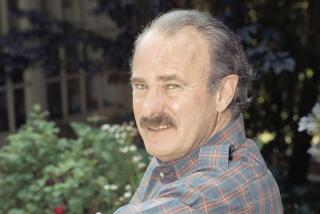From the Archives: Chuck Connors, ‘The Rifleman,’ Dies at Age 71
- Share via
Chuck Connors, the professional baseball player who became an actor best known for his title role in the television series “The Rifleman,” died Tuesday. He was 71.
The 6-foot, 5-inch actor died of lung cancer at Cedars-Sinai Medical Center where he had spent the past week.
Connors became well-known in the Western series, which ran from Sept. 30, 1958, until July 1, 1963. He starred as Lucas McCain, a New Mexico homesteader bringing up a son by himself. His trademark in his continuing battle with villains was a fast-cocking Winchester rifle with a large ring that supposedly allowed him to fire off the first round in three-tenths of a second.
Connors also starred in the Western series “Branded,” which was telecast from Jan. 24, 1965, until Sept. 4, 1966. His role was that of Jason McCord, a West Pointer who was dismissed from service with the rank of captain because of supposed cowardice. McCord roamed the country in the 1880s trying to prove that he was not a coward.
Connors played a lawyer named John Egan in the short-lived 1963 television series “Arrest and Trial,” had a major role in “Cowboy in Africa” in 1967 and narrated 52 episodes of a syndicated documentary on stunts called “Thrill Seekers.”
Switching from hero to villain, Connors appeared as Jeb Hollister in the short-lived but critically acclaimed series “The Yellow Rose.” Originally telecast from October, 1983, to May, 1984, the series, starring Sam Elliott, David Soul and Cybill Shepherd, returned as a summer rerun in 1990.
Connors was philosophical in an interview nine years ago:
“My life is pretty good now. I’ve had my bumps along the way, personally. But I’ve got a tremendous relationship with my four sons, have four or five very good friends and a lot of nice acquaintances. I have a nice ranch, pretty good health and I don’t ever have to work again.”
Born Kevin Joseph Connors on April 10, 1921, in Brooklyn, N.Y., Connors was educated at Seton Hall College.
He began his career as a professional basketball player, but then switched to baseball, playing for the New York Yankees, the Brooklyn Dodgers, the Chicago Cubs and the Los Angeles Angels.
In Hollywood, he picked up occasional roles in films, and he formally changed careers in 1953 after the success of “Pat and Mike,” in which he appeared with Spencer Tracy and Kathryn Hepburn in 1952.
“After long and careful deliberation I have decided to retire from professional baseball in favor of a career in motion pictures,” he wrote Angels President Don Stewart.
“It has not been an easy decision to make,” he continued in the letter, which was published by The Times. “Baseball has been my whole life since boyhood. . . .
“Baseball owes me nothing. I owe it all that I have and much of what I hope to have. Baseball made my entrance to the film industry immeasurably easier than I could have made it alone. To the greatest game in the world I shall be eternally in debt.”
After batting only .259 the previous season, Connors predicted that he had only a couple of seasons left and said his career in baseball had “reached the twilight stage.”
He went on to make the films “Target Zero” in 1954, “Hold Back the Night” in 1956 and “The Big Country” in 1958.
In 1959, he told The Times that acting was a snap compared to baseball.
“In acting, if I mess up a scene, if I strike out on a speech, they re-shoot it. So when I’m acting I have to be batting 1.000.”
Connors became far more marketable, however, after the 1958-63 television series. His films in the 1960s included the title role of “Geronimo” in 1962, “Flipper” and “Move Over, Darling” in 1963, “Synanon” in 1965 and “Ride Beyond Vengeance” in 1966.
Connors preferred Western and action films, but he often mixed those with satirical comedy, such as “Support Your Local Gunfighter” in 1971 and “Airplane 2: The Sequel” in 1982.
In addition to his half-dozen television series, Connors also appeared in well-received miniseries, including Alex Haley’s “Roots” in 1977 and 1978. He was nominated for an Emmy for his role as the lustful slave owner Tom Moore.
Connors had major roles in television movies, including “Nightmare in Badham County” in 1976, “Standing Tall” in 1978 and “The Tourist Trap” in 1979.
But Connors had no doubt he was best remembered for his “Rifleman” role.
“It’s no problem at all for me,” he said in 1983. “My whole ability to make a living is derived from the fact that I was ‘The Rifleman.’ ”
A close friend of former President Ronald Reagan, Connors demurred when friends suggested that he run for political office. His reasoning was that “being around so many politicians, I became a little cynical about politicians in general.”
He had an episode in personal diplomacy in 1973 at former President Richard M. Nixon’s San Clemente White House, when then-Soviet leader Leonid Brezhnev gave him a bear hug. Connors gave Brezhnev two six-guns.
The tough-guy hero and villain cried when he won his star on the Hollywood Boulevard Walk of Fame.
Connors was married and divorced three times. He is survived by four sons.
From the Archives: Walter O’Malley, Owner of Dodgers, Dies at 75
From the Archives: Ossie Davis, 87; Actor Played a Powerful Role in Civil Rights Gains
From the Archives: Kim Hunter, 79; Won Oscar for ‘Streetcar’
From the Archives: Ex-Sen. Hayakawa Dies; Unpredictable Iconoclast
From the Archives: Leo Carrillo Dies of Cancer at Home Here
More to Read
Start your day right
Sign up for Essential California for the L.A. Times biggest news, features and recommendations in your inbox six days a week.
You may occasionally receive promotional content from the Los Angeles Times.






